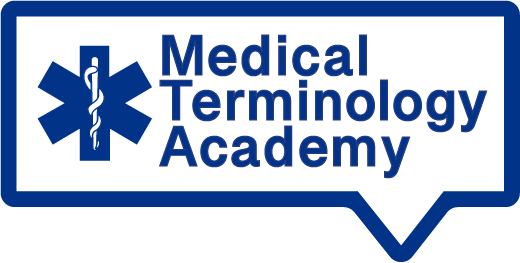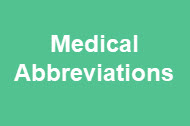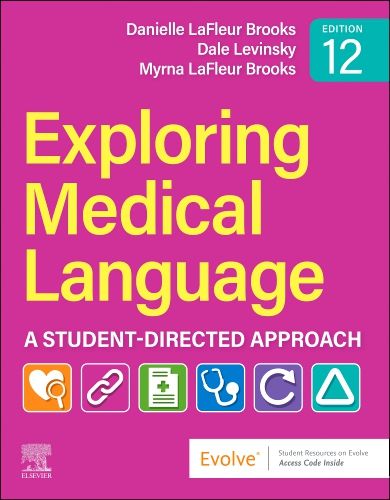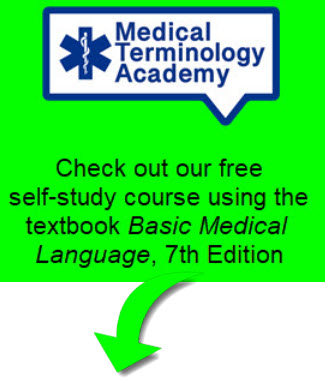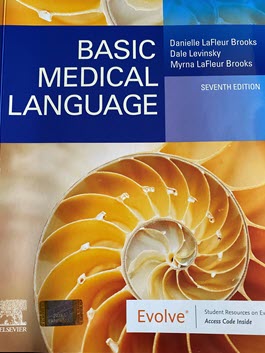What is Medical Terminology?
Medical terminology is the study of medical terms that make up the universal language of medicine and healthcare. Medical terms describe anatomical structures, medical procedures, conditions, processes, and other aspects of disease and treatment.
Why Use Medical Language Instead of English Language?
Medical language allows for clear, concise, and consistent communication locally, nationally, and internationally. Also, fewer words are used when using medical language. The medical term osteoarthritis is one word, whereas, in the English language, it requires six.
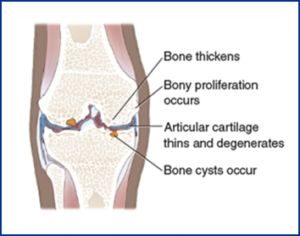
When said using medical language, osteoarthritis
When said in English: inflammation of the bone and joint
The benefits of using medical language include:
- The meaning of the medical term does not change, regardless of the national Language.
- It enables everyone involved in medicine and health care to perform more accurately and efficiently.
- It ensures a consistent understanding of language across the continuum of care.
Why Learn Medical Language
Medical language is necessary for those employed in healthcare. It can help you advance your career or prepare for further education in the medical field. Or, if you are seeking to improve communication with your healthcare provider or interpretation of your medical records or healthcare coverage, knowing medical terms can be helpful.
The History of Medical Language
Medical language began with the ancient Greeks over 2,000 years ago. Hippocrates and Aristotle were among the first to study and write about medicine. The Romans continued the practice, adopting elements of the Greek language to use alongside Latin.
Most terms used today are formed from Greek and Latin word roots, prefixes, and suffixes, such as oste/o/arthr/itis.

Medical terminology continues to evolve and adapt to the ever-changing landscape of medicine and healthcare. Included in today’s language, besides terms built from Greek and Latin word parts, are terms that are:
- Eponyms – derived from a name or place. (Alzheimer disease)
- Acronyms – formed from the first letter of a phrase. (laser-light amplification by stimulated emission of radiation)
- Modern Language English Terms – descriptive of technology and procedures. (nuclear medicine scanner)
Memorizing long and seemingly complex medical terms can seem overwhelming. In our textbooks Exploring Medical Language,11th Edition, and Basic Medical Language, 7th Edition, Elsevier, we simplified learning by separating the terms into two groups with specialized exercises for each.
Medical Terms Divided into Two Groups
- terms built from word parts
- terms not built from word part
Why Learn Medical Terminology Online
Several tried-and-true methods can be used when studying medical terms. One of the easiest is to take an online medical terminology course. Online learning can offer several benefits, especially in today’s digital age.
Here are some of the advantages:
- Preparing for Healthcare Programs: If you plan to pursue a career in healthcare, learning medical terminology online can be an excellent way to prepare for medical school, nursing programs, or other healthcare-related education.
- Career Advancement: Earning a certificate or credits by completing an online medical terminology course can enhance your qualifications and career prospects.
- Flexibility and Convenience: Many online courses allow you to learn at your own pace and schedule. You can access course materials and lectures anytime, making it convenient for those with busy schedules or other commitments.
- Accessibility: Online medical terminology courses are accessible globally. You can learn from anywhere worldwide with an internet connection, which can be especially useful for individuals in remote areas or with limited access to traditional educational institutions.
- Self-Paced Learning: Online courses typically provide self-paced learning options, allowing you to progress through the material at your own speed. This benefits individuals who want to spend more time on challenging topics or move quickly through familiar ones.
- Multimedia Resources: Online courses often incorporate multimedia resources, such as videos, interactive quizzes, and animations, to make learning more engaging and effective. These resources can help you visualize and understand complex medical concepts.
- Access to Experts: Most online courses are taught or supported by healthcare professionals and educators. This gives you access to knowledgeable instructors who can answer your questions and guide you.
- Immediate Feedback: Online courses often include automated quizzes and assessments that provide immediate feedback on your progress. This can help you identify areas to improve and tailor your learning accordingly.
- Updated Content: Medical terminology is dynamic, and online courses can be updated more quickly than traditional textbooks. This ensures that you are learning the most current language and medical practices.
In summary, learning medical terminology online offers flexibility, accessibility, and a range of resources to make learning efficient and convenient.
Begin building your medical language vocabulary by learning medical terms with the Medical Terminology Academy Online Course.

